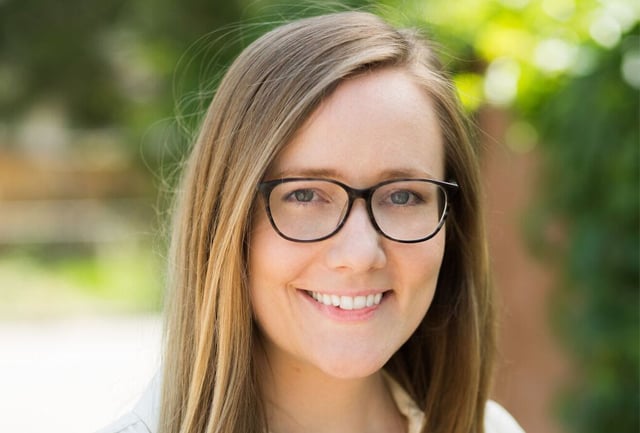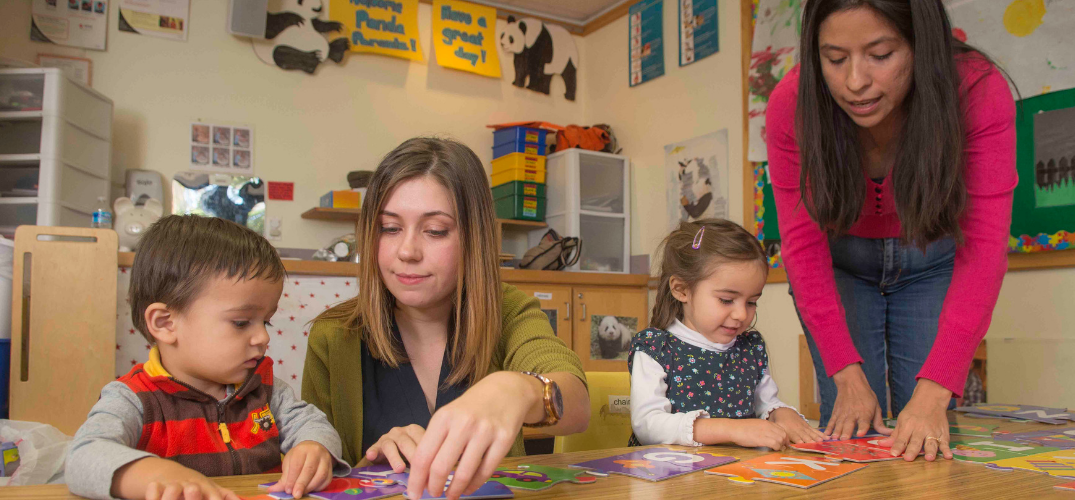
Achievement gaps start early for children in families with low incomes. Access to high-quality early care and education programs help young children develop social and emotional, language, and academic skills needed to succeed. In this blog, you will hear from Ashley, a family advocate who uses her personal experience to make the case for why it’s important for states and communities to invest in early care and learning programs as one strategy for ensuring the next generation has the skills they need to overcome poverty.
My memory of the Head Start preschool room is so vivid. The program created a safe and fun leaning space, which left me with many long-lasting happy memories in an otherwise difficult childhood. I remember the puzzles and activity bins full of dry pasta and colorful beads. The walls were covered in messy art projects and there were always crafts hanging from the ceiling by yarn tied to paper clips. Our names were on every creation like a badge of honor. Our time there meant something more than just the publicly funded meals we received. Sadly, for some, those breakfasts and lunches were the only meals they would eat that day.
Though investments in early childhood programs are often fall short of the need, in my life, Head Start has paid off in spades. I was the fifth child in my family growing up in rural Missouri; however, I was the first to attend Head Start. My newly single mother struggled to make ends meet by balancing whatever low-wage jobs she could find, despite her college degree. Teachers would ask why I often fell asleep in class and my mother would explain that I rarely slept through the night while she was at her factory job. I had Head Start during the day, but my older siblings and I were home alone many evenings due to the lack of child care options when our mother worked late shifts. Thankfully, my early education teachers always reminded me of my potential and cheered me on throughout the rest of elementary school. Their investments put me on the advanced track at an early age.
None of this changed our immediate economic position. Head Start merely ensured I was ready to learn and planted the seed in my mind that my potential was limitless. The rest took a lot of work. Publicly-funded early care and education programs acknowledge the challenges many working families face and offer help at a time when a child has the most potential yet requires the most effort. Eventually, I attended the same community college all my older siblings had. Wonderful letters of recommendation from my instructors then helped me get into Washington University in St. Louis, a top university. Two years later I graduated and continued to encourage other children and families I encountered that faced similar challenges. I studied abroad in France and Norway, taught at international youth leadership conferences in New York, Washington, D.C., and South Korea. I even returned to Washington University for a master’s degree in international affairs with a focus on international development. Along the way, I learned how poverty and inequality looks different in other countries. I count myself blessed, but I know just how remarkable my education and outcome has been from Head Start onward!
I never knew Head Start was a special federally-funded program for children in low-income homes until I heard of the debate over funding and the impact of early care and education. These programs always seem to be at risk just like the families they benefit. The benefits are cognitive and social, but these programs often also coordinate access to other vital dental and health programs. My success is proof that high-quality early care and education has life-long benefits.
The question is not, “Can we afford to invest public dollars in early care and education programs?” but can we afford NOT to invest in them? Opportunity Cost is the lost potential of generations of children that otherwise do not have a fighting chance to make it out of poverty. The American Dream cannot be fully realized without the opportunity to prosper as productive members of society. Quality early care and education programs must be one of our top national priorities and investments.
Ashley Dodge enjoys spending her free time with her dog and five nephews and nieces. She is Marketing Director for an insurance group in Colorado Springs, Colorado, teaches at UCCS and is on the board of the Colorado Springs World Affairs Council.
The Supplemental Nutrition Assistance Program (SNAP) is another important early childhood investment that can help reduce poverty. Support the Farm Bill/SNAP by making your voice heard and taking action.
Family stories influence program and policy decisions! The Family Voices Series is a collection of stories that elevate the triumphs, challenges, and opportunities families experience in child care and early education, both locally and nationally. So grab your favorite cup of coffee or tea to enjoy while you immerse yourself in the real-world child care experiences of families from across the nation or take a stand and share your story with families alike.







